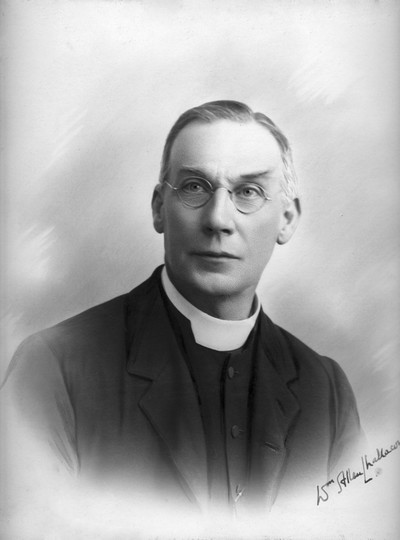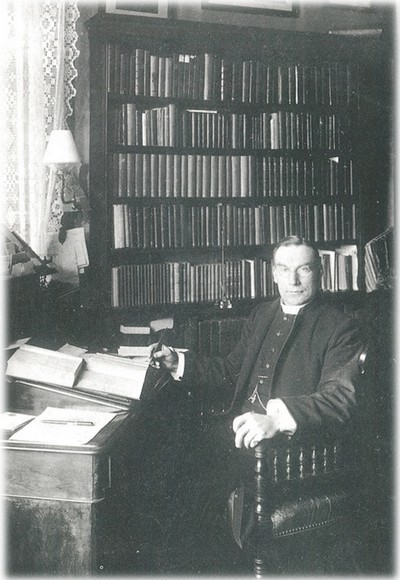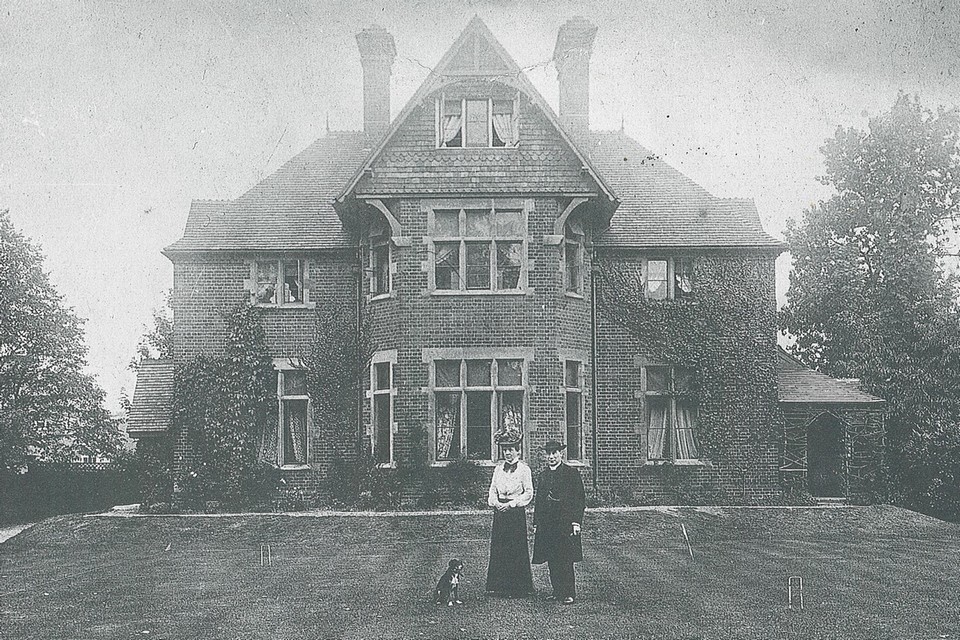William Allen Challacombe (1893-1920)

The second Vicar of Christ Church, William Allen Challacombe (1862-1951) arrived in New Malden in January 1893. He was 31 years old. Known to the congregation and parishioners as Mr Challacombe, he was called Allen by his wife and close friends.
Challacombe was, it seems, a gentler character than his predecessor, the first Parish History commenting that ‘frequently, in the pulpit he was found weeping with those who weep in sorrow for he had a sensitive nature and was easily wounded. Yet thankfulness and praise came readily to him as becomes the man of God’.
The photo below shows Challacombe in his study. In the Parish History, William Authers describes him as strongly Evangelical', and that 'He kept closely to the Prayer Book, and his Bible was to him the Word of God'.

The conflict that had accompanied much of Charles Stirling’s ministry was much less evident and symbolised by the return of Frederick Merryweather to Christ Church and the good relationship he had with its Vicar before Merryweather’s death in 1900. Against this background, Holy Trinity Church in Malden Road, formed as a breakaway from Christ Church in 1870, was less needed, and closed in 1911.
In 1905 New Malden became part of the new diocese of Southwark and the following year Mr Challacombe became one of the Cathedral’s first honorary canons.
Allen Challacombe wrote at least two books. In The Soul’s Wardrobe, published in 1894, he examined the metaphor of clothing used in the Bible and the way in which God, through Christ, removes the ‘garments stained with sin’ and clothes the believer in ‘the robes of righteousness’. Bond and Free or The Prevalence, Power and Pardon of Sin, published in 1898, was based on sermons that Mr Challacombe had preached at Christ Church during Lent 1897 and written with the aim of leading ‘…some of its readers out of bondage into the glorious liberty wherewith Christ makes the believer free’.
Mrs Jessie Challacombe
Allen Challacombe married Jessie Worsfold in 1891 whilst he was a curate in Dover. Mrs Challacombe had a significant ministry at Christ Church. This included visiting those who were sick and leading a group that made clothes for those who were poor. She ran a Bible Class for girls at the Vicarage on a Sunday afternoons and was an Associate at the branch of the Girls’ Friendly Society established at Christ Church.
Jessie is pictured below with Allen Challacombe in the vicarage garden.

During her time in New Malden, Jessie Challacombe wrote a number of Christian novels, all published by the Society for the Promotion of Christian Knowledge: The Brother’s Promise (1897); Little Christopher’s Cross (1898); Faithful Pollie; Jenny and her Friend in Trouble; A Poor Man’s Palace Rebuilt; How the Fire Spread; Twilight Stories (1902); Nell Garton (1904), Gilt and Gold; Jane Stiggins (1910); Wait and Win; David’s Diaconate or Gathering the Fragments (1912) and Tops: The Story of a Poor Waif (1913). The enormous number of children attending Sunday Schools provided a national market for such books as prizes.
Most of the stories written by Jessie Challacombe were about young people, often from humble backgrounds, seeking to make their way through difficulties and the difference made to this by their Christian faith. The central characters within the books are strongly idealised to serve the aim of their being a role model for the young people who read them.
During the Covid restrictions in 2020, our current vicar Stephen Kuhrt recorded readings of the 1898 novel Little Christopher's Cross and the 1904 novel Nell Garton (with his daughter Abigail playing the part of Nell).
The resignation of Allen Challacombe
Challacombe resigned as Vicar in August 1920 at the age of 58, his twenty seven years and eight months in post being precisely the same length as that of his predecessor, Charles Stirling. The first Parish History notes 'In a parting word he said it had been to them a happy service because his people had made it so by their kindness and generosity ... That his labours were appreciated was evidenced in the respect and esteem shown him on all sides'.
He lived until 1951 but his wife Jessie died in 1925 and it was in her memory that the Oak Panelling in the Chancel was given.
| Charles Stirling | Building CCNM 1893-1920 | Alvan Birkett | ||
